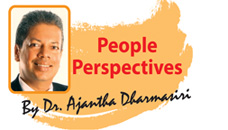A question of personality
 Personalities of people play a pivotal role in their personal and
professional fronts. The Oxford dictionary defines personality as the
visible aspect of one's character as it impresses others. Today's column
is an exploration and an explanation of the aspects of personality. Personalities of people play a pivotal role in their personal and
professional fronts. The Oxford dictionary defines personality as the
visible aspect of one's character as it impresses others. Today's column
is an exploration and an explanation of the aspects of personality.
One may look at Arnold Schwarzenegger and say that he has 'very good'
personality. In contrast, a thin and skinny may be viewed as one without
'a personality'. Is this what personality really means? The answer is
'no'.
The term personality originates from the Latin word, persona, which
means a mask. In ancient Latin theatre, a mask was used to represent a
character. In other words, it is what you show to the world, by way of
words and deeds.
There are a variety of ways of looking at personality. According to
Wikipedia.org, it is the particular combination of emotional,
attitudinal and behavioural response patterns of a person.
Researchers define personality as enduring, distinctive thoughts,
emotions, and behaviour that characterise the way a person adapts to the
world.
The key highlight here is adaptation. From the womb to the tomb, it
is a journey of adaptation, with constant interaction with the
surroundings.
They also state that personality is the sum total of characteristics
that differentiate people or the stability in a person's behaviour
across different situations. One may fight and the other may take flight
for a given situation. The response reveals their personalities.
 Behavioural scientists say that there are three key determinants of
personality. They are heredity, environment and situation. What do we
mean by heredity? Behavioural scientists say that there are three key determinants of
personality. They are heredity, environment and situation. What do we
mean by heredity?
It is what we get from our forefathers. In essence, genetical
influence matters. We've heard the saying, 'like father, like son'. It
applies to personality as well.
Environment
The second determinant is environment. It is all about nurture more
than nature. There was an interesting story published by the Time
magazine sometime ago. It was on the whereabouts of twins who were
adopted by two families.
Of the two sons born to a poor family, one was adopted by a very rich
business family. The other child was adopted by a middle income family.
The first son got all the comforts and benefits and ended up running
the multi-million-dollar family business. The second son got exposed to
illegal drug trafficking and was very much involved with it. It all
ended up in a long-term jail term in an isolated prison cell.
Time magazine interviewed the twins and asked the same question.
"What made you to come to the point where you are now?" Surprisingly,
both gave an identical answer. "Given the environment, what else you
would expect me to be?" The point here is the environmental influence on
personality.
It also reminds me of a Jathaka story. Two parrots were for sale and
were bought by two families. One parrot was exposed to a gentle, soft
and polite way of speaking and it did respond exactly to that.
The second one was surrounded by those who frequently used foul
language. The parrot did demonstrate exactly the same. However, whether
parrots have personalities or not is a separate issue.
Situation
The third determinant of personality is situation. To be precise, it
refers to critical incidents. We have seen in Asian politics, how many
widows came to the limelight from nowhere following their husband's
demise. That critical event impacted their personality.
A variety of attempts were made to measure personality in a
scientific manner. The Myers-Briggs Type Indicator (MBTI) assessment is
the most popular personality measure in the world. It is a psychometric
questionnaire designed to measure psychological preferences in how
people perceive the world and make decisions. The foundation for MBTI
came from the original work by a veteran psychologist, Carl Gustav Jung.
He published the details in his 1921 book titled, Psychological Types.
Katharine Cook Briggs and her daughter, Isabel Briggs Myers, worked on
Jung's findings in developing MBTI.
As a personality type diagnostic instrument, it indicates one's
communication style, decision-making style, attitudes towards time,
goals, conflict and also social preferences.
"Whatever the circumstances of your life, the understanding of type
can make your perceptions clearer, your judgments sounder, and your life
closer to your heart's desire," so said, Isabel Briggs Myers (1962). It
points to the need to be aware of your personality type with its
associated strengths and shortcomings.
The MBTI approach presents four personality dimensions, and
categorises people into four pairs.
Based on social orientation: Extrovert (E) versus Introvert (I)
Based on information gathering method: Sensing (S) versus Intuitive
(N)
Based on information evaluation method: Thinking (T) versus Feeling
(F)
Based on information gathering speed: Judging (J) versus Perceiving
(P)
Accordingly, there can be 16 different combinations of MBTI
personality types such as ESTJ. Let's take it as an example to expand.
ESTJs are regarded as guardians. ESTJs generally have the following
traits:
Natural leaders - they like to be in charge, value security and
tradition, loyal, hard-working and dependable, athletic and wholesome,
have a clear set of standards and beliefs which they live by, no
patience with incompetence or inefficiency, excellent organisational
abilities, enjoy creating order and structure, very thorough, will
follow projects through to completion, straight-forward and driven to
fulfill their duties.
Similarly we could look at all 16 different types to see the emerging
profiles. There are also other ways of looking at personality. Let's
discuss them next week.
The writer is the Director of the Postgraduate Institute of
Management. He also serves as an Adjunct Professor in the Division of
Management and Entrepreneurship, Price College of Business, University
of Oklahoma, USA. |

